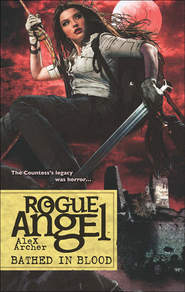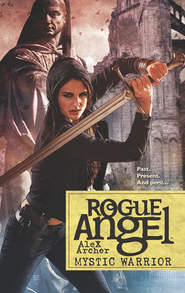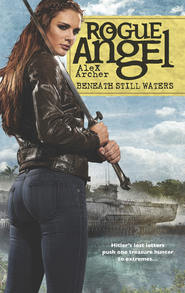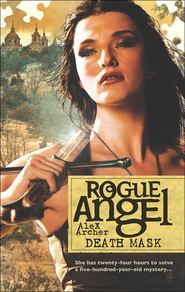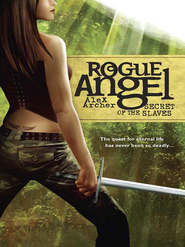По всем вопросам обращайтесь на: info@litportal.ru
(©) 2003-2024.
✖
The Mortality Principle
Автор
Год написания книги
2019
Настройки чтения
Размер шрифта
Высота строк
Поля
If she could find one worth telling.
And with that thought it was as if something had clicked inside her head.
She had found something to search for even if she had no idea what it was.
This might be the golem’s city, but there had to be a more fascinating story beneath it, something better, in a city as old as Prague. She’d come across an epigram in her notes: Your problem, city, is that you have no soul. She couldn’t recall where she’d come across it, but she liked it.
Annja pondered the notion of going out to Sedlec, in the Kutná Hora suburb, to check out the ossuary. There was a building with a story to tell—a church dating back eight hundred years, with upward of seventy thousand corpses exhumed, their bones used to decorate the chapels. Chandeliers of bones, garlands of skulls, an altar consisting of every single bone from the human body, monstrances fashioned from childlike skeletons and the Schwarzenberg coat of arms, also executed in bone. It was like nowhere else on Earth. That a half-blind monk had done the exhumation five hundred years ago was the stuff of macabre fairy tale, rather like the bone sculptures of the carpenter František Rint, who was behind the decor. Could she somehow marry that in with the stories of the golem? A made man against a backdrop of a quite literally man-made chapel? It would provide an incredible visual for the live broadcast, she realized. It was a possibility.
She stuffed a handful of the leaflets into her bag and headed out with a little more of a spring in her step than when she’d come back into the room.
Even without consulting the street map she’d picked up from reception, she knew that there were any number of places she could start looking for her story that didn’t involve heading out to the ossuary. The most obvious was the city’s Old Town.
A convenient signpost only a few yards from her hotel pointed her in the right direction. The streets were considerably more alive if not teeming with tourists. Give it another hour, though, and that would be an entirely different matter. She walked on, looking at the endless matryoshka dolls on display in the shop windows around her.
The traffic had started to build up toward the morning rush hour, but the way the city was constructed, most of it never entered the more pedestrianized center. Some of the wider boulevards with expensive designer-brand stores were lined with lush trees and lusher price tags while the narrower streets were snarled up with people trying to take shortcuts. That was another legacy of cities first built before the invention of the internal combustion engines; some survived by keeping the traffic out of town as much as possible while others allowed developers to gradually change the landscape. Prague, it seemed, wanted to be the best of both worlds, but just might be the worst.
She turned onto Karlova Street and kept walking.
A delivery bicycle hopped onto the curb to pass a stationery van delivering parcels. Annja had to step out of the way, ducking into the deep doorway of a building. There was no point in yelling at the cyclist’s back; he was already half a street away. No one was hurt, nothing was broken. An impatient car—a big black shiny SUV—behind the van sounded its horn. The van driver showed no sign of moving for the time being. He climbed out of the cab and gave a wave that, while it was meant to say Bear with me, I’ll only be a moment, came across more like Screw you, I was here first.
Annja realized he was heading straight toward her, package in hand.
She stepped aside to let him get to the door, catching sight of the confused expression on the man’s face, and guessed he’d thought she’d come down to take the delivery from him.
“Sorry,” she said as she let him ring the bell.
He just nodded, obviously uncomfortable with the foreign language.
It was an unassuming little archway that promised the internet, a hair salon and a tobacco shop farther inside. There was a face carved into the keystone above the arch. As she stood on the sidewalk, she read the sign on the door. Kepler Museum.
She’d heard of Kepler, of course. He’d been a key figure in the seventeenth century scientific revolution, with his breakthroughs in the understanding of planetary motion providing the groundwork for Isaac Newton’s gravitational theory.
She was still trying to trawl her memory for anything she could remember about Kepler when the door opened. A middle-aged woman appeared on the doorstep to take the parcel. She signed his clipboard, then looked up at Annja, obviously unsure what she was doing loitering in the museum’s doorway.
She was still looking at her when the man slammed the door on his cab and gunned the engine, much to the relief of the waiting line of vehicles that snaked down the length of Karlova Street.
“Hello,” Annja said.
“Ah, hello,” the woman replied. “I’m sorry, but we do not open for another hour.”
She took a step out from under the archway to look up and down the street, rather like some wartime spy looking for a tail. Annja couldn’t help but smile to herself at the image. Maybe being in Eastern Europe was beginning to rub off on her way of thinking.
The traffic began to move again, following the van down Karlova Street toward the wider roads that waited beyond.
There was no one else on foot.
“You’re welcome to come inside, if you don’t mind the old house being a little on the chilly side. We seldom get visitors so keen they’re standing outside waiting for us to open.”
“Thank you,” Annja said, offering a smile, happy to play the excited tourist rather than correct the woman’s assumption. The entirety of her plan today was to follow the whims of the universe. If this was where the wind blew her, to this door in this part of town, then this was where she needed to be. How she got here, by accident or design, didn’t matter.
She followed the woman inside.
The air was a good ten degrees colder on her skin than it had been outside.
The woman disappeared through a doorway along the corridor, the old wood-and-glass paneled door swinging closed for a moment before she opened it again. She wedged a rubber stop under it to prevent it from swinging closed again.
“Please,” the woman said, beckoning Annja into her small office where papers and files covered every inch of the two desks. “Would you like coffee? I find that I can’t do anything until I’ve had at least my second cup of coffee in the morning. That is, unless you’d be happier taking a look around yourself?”
“Actually, it’s been one of those days already, so I could use a decent cup of coffee. And then, if you’re willing, I’d love it if you showed me around,” Annja said.
“Then coffee and the grand tour it is.”
The woman busied herself with an expensive coffee machine.
Annja picked up one of the brochures from the pile that lay on the top of the filing cabinet. It was newer than the ones she’d seen in her hotel room, but offered much the same information. It was hard to imagine that the glossy paper produced all that many additional visitors. But then not all tourists were as jaded and world-weary as she’d been feeling recently.
Looking at the brochure didn’t inspire any great sense of adventure, though, and surely that was how you sold history? You made it come alive and feel real. This one offered little other than the fact that Kepler had worked in the city between 1600 and 1612, and was written in five different languages—though not well, it seemed, in any of them—beneath a reproduction of the portrait that was set in the keystone above the arch outside. There were a few pictures of the exhibits, as well. The flipside provided a small street map with an arrow pointing to the museum’s location, which, given that she was already standing in the middle of it, was fairly redundant. That said, Annja wasn’t sure she would have been able to find the small museum on the basis of the map alone, even though her hotel was only a few streets away.
“It doesn’t give a lot away, does it?” the woman said with a beaming smile on her face. She handed Annja a mug that bore the same portrait. She wondered idly how the astronomer would have felt to know his face had become a brand. “But then, we wouldn’t want too many people banging down the door in search of some Holy Grail or other. We like it just as it is.”
If it was good enough for the woman, it was good enough for Kepler himself, and that meant it was good enough for Annja.
“So, tell me, what brought you to our doorway? Do you have a special interest in Kepler? Or is it going to rain?”
Annja smiled at that.
“Perhaps I should explain,” she began. She fished out a business card from her bag. She handed it over. The woman looked as if she was being offered confirmation that they were receiving a surprise visit from the tax man, but eventually her expression lightened.
“Annja Creed,” she said. “Chasing History’s Monsters.”
It never ceased to amaze Annja when she came across people outside the mainland United States who’d heard of the show.
“I’m afraid I’ve never seen the program,” the woman said, piercing that particular bubble apologetically. “But my sister lives in New York and her son loves it. He talks about it every time I speak to him. You’ve made quite an impression on him, but then, he is a teenager.” Her grin was knowing.
“Do you think I could get you to sign something to send to him? He would be absolutely thrilled.”
“Of course,” Annja replied.
The woman looked around for a piece of paper, then decided it might be more fun if Annja signed one of the museum’s brochures. She was more than happy to oblige. It wasn’t exactly a hardship to send her best wishes to the budding archaeologist, and it gained the woman’s gratitude. She had no idea if there was a story here, but if anyone was likely to be able to help her find it, it was the curator.
“So are you thinking about doing a program about Kepler?” Her brow furrowed for a moment, seeming to realize something. “I would never have thought anyone would consider him a monster.”
“Unless you know some deep, dark secrets,” Annja said. “I’m in Prague to make a segment about Rabbi Loew and the golem, but I’ll be honest, I’m not exactly finding it inspiring.”
“Ah, yes, the golem. Now there was a proper monster,” she said. “In the oldest sense of the word. So what are you looking for?”
“Inspiration,” Annja said, painting as broad a canvas with the single word as she possibly could. “The city has to have more than one story to tell. If not here, then somewhere nearby. I am just following my nose. If I can’t find anything, then I’m not really sure what I’m going to do just yet. Maybe back to the golem if I can find a fresh perspective.”






